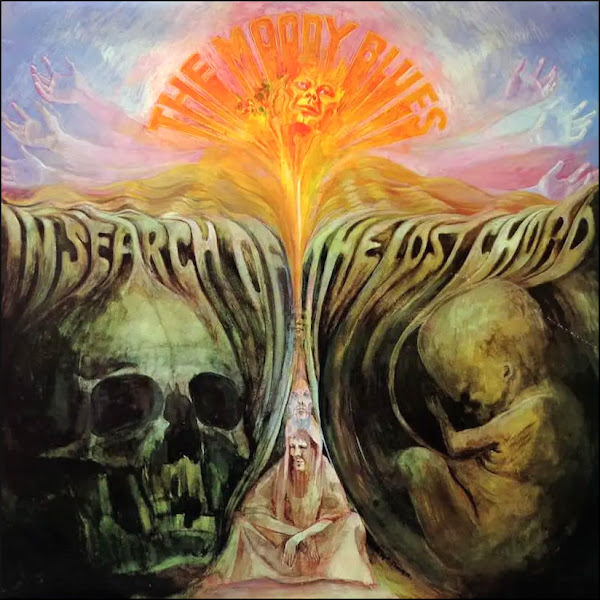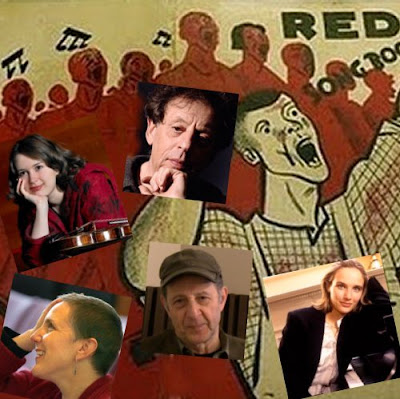In search of the lost link from non-classical to classical
In previous posts I have explained how a rock band provided a link from the non-classical to classical worlds, a link which led me not only to a deep appreciation of great music, but also to a career working in the classical industry and BBC. But does the link to a rock band make me "dumb and dumber"? Let me explain why I ask that question.
In a recent post I described the 1986 meeting between the great mythologist Joseph Campbell and Jerry Garcia from the Grateful Dead, and there is another link between Joseph Campbell and rock music. Founder member of the prog rock band The Moody Blues and Mellotron specialist Mike Pinder has explained that Campbell's work persuaded him to devote his time post-Moody Blues to bringing myths and music to young people. Mike Pinder is a Fellow of the Joseph Campbell Foundation, and his 1995 spoken word album A Planet with One Mind, a mythological tales for children from cultures countries including Native American, Aztec, Chinese, and Nigerian, was shortlisted for the Benjamin Franklin Award for Excellence in Audio.
Previously I had explained how in 1971 two albums spent much time on my Pioneer PL-12D turntable: one was the soundtrack album for Visconti's newly-released Death in Venice movie which introduced many of us to Mahler through the Adagietto of the Fifth Symphony, the other was the new Moody Blues album Every Good Boy Deserves Favour. Mike Pinder's band unique brand of classic rock provided a priceless link from the non-classical to classical worlds, and it opened a door for me to riches beyond measure.
One of the reasons why classical music has failed gain traction with new audiences is that the value of these links from non-classical to classical are no longer valued. Instead the flawed theory is that if you throw enough Mahler and Shostakovich at new audiences they will be won over. But in fact the rot goes much deeper. Not only are the links from non-classical to classical are no longer valued, they are actively despised and ridiculed. No better example is the reception to the launch of the BBC Sounds and BBC Radio 3 12-part series about classical music presented by vocalist, songwriter, record producer and director Devonté Hynes. This reception is summarised by the headline in the classical industry-endorsed website Slipped Disc Dumb, dumber, NY pop star to present BBC classical music series.
We live in a post-truth age. So let's leave aside the fact that Devonté Hynes was born in Ilford, Essex, England. It is not just the toxic headline that explains why classical music is failing so badly to sell itself to establishment decision takers, it is also the numerous equally toxic comments from Slipped Disc readers representing the global views of classical devotees. Just one example is "This is where we are headed. Nah, where we are. The dumbest, the most vulgar the better. There is no dignity left in the classical music biz".
Devonté Hynes' music may not be to my taste. But one thing I have learnt in more than seven decades is not to despise and ridicule something simply because I don't understand it. Classical music is currently suffering globally from misguided funding decisions imposed from outside - BBC cuts, Britten Sinfonia, Vienna Radio Symphony Orchestra, Opera Australia etc. Links between non-classical and classical music matter, and juvenile screaming of 'Dumb, dumber' is not only unproductive, it is also damaging the credibility and future of classical music. The BBC. Arts Council England et al have undoubtedly made bad and damaging decisions. But sorry, classical music's real problem is internal, not external.










Comments
And thank you for eloquently making the case for classical music. Your level-headed prose is a stark contrast to the increasingly shrill and confrontational protests elsewhere. It saddens me to see the damage being inflicted on classical music from outside. But the artform's increasing tendency to self-harm also saddens me.
https://wenatcheethehatchet.blogspot.com/search/label/ragtime%20and%20sonata%20forms
There's such a wealth of theoretical work on formal analysis in the last twenty years that the conceptual tools to develop pop/classical syntheses have been available since roughly the dawn of this century. The problem, as I see it, has been academic turf wars within classical and pop have tended to balkanize teams against each other rather than seek for convergences (I know, I've beat that drum a few times!). As much as I dissent from his conclusions about jazz Adorno was right when he insisted that theorizing is necessary for any further breakthrough in the arts. I just happen to think that Adorno (and Scruton after him) were both wildly wrong about the limitations of the vocabulary of popular styles. The problem isn't the possibilities in the vocabulary, the problems have been a lack of dedicated exploration of concepts of musical time and space and proportional correspondences. To that end I've drawn on George Rochberg (who expanded on Zuckerkandl) and Ben Johnston to at least "start" a potential path for restoring a synergistic relationship between "pop" and "classical" that I think was more robust in earlier epochs before post-Wagnerian art-religion emerged. Not my two cents exactly, more like 43 cents.
Classical and pop diverged so far back that I think we might "have to" go back to ragtime and move forward from there. There are successful fusion experiments. I think Nikolai Kapustin's preludes and fugues for piano actually work and I'm looking forward to hearing the recently recorded string quartet cycle of Wadada Leo Smith, a jazz trumpeter who has composed a set of string quartets over the last half century that have only recently been recorded. ArtsFuse had a piece on how the "in between" zone of classical and jazz is becoming more robust and has a more robust body of work. Purists in both camps tend to be too dismissive of efforts at synthesis. I say we keep trying and if we fail, we fail, but if nobody tries for a more balanced fusion the fusion will never occur. If Haydn could unite the highbrow and lowbrow of his time and place there's no reason it can't be done in the here and now.
Rather, it was film music, particularly sci-fantasy (Star Wars, the Star Trek films, Rosenman's score for the Bakshi Lord of the Rings) that became my doorway. I wanted more like that. I wanted to know where it came from.
And it is from there that over time I found I was embracing Ravel, Debussy, Mahler, Copland, Vaughn Williams, and of course Holst's Planets (and far more than Bach or Mozart). I found those late Romantic and early Modern works to be as fulfilling as imagination-building as the film scores. In effect, a film score without the baggage of having seen the film.
Unfortunately, in social media, few would encourage my journey. Rather than go "You like John Williams, try this stuff" and rattle off a few composers...we instead just see "Williams is just a second-rate hack."
And instantly you've lost them. Instantly you've told them what they value is worthless, so WHO THEY ARE is worthless. It is so the worst thing to do, and yet it happens all the time, the elitism that denigrates the newbie or their likes rather than welcomes them with new things to explore based on knowing what they already like.